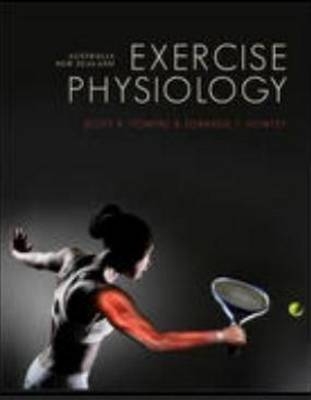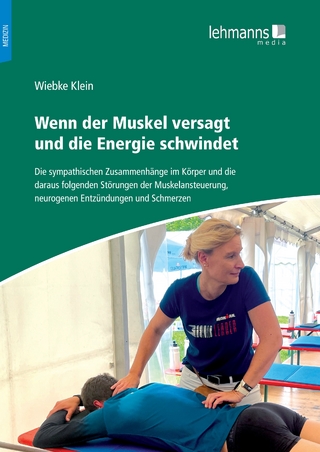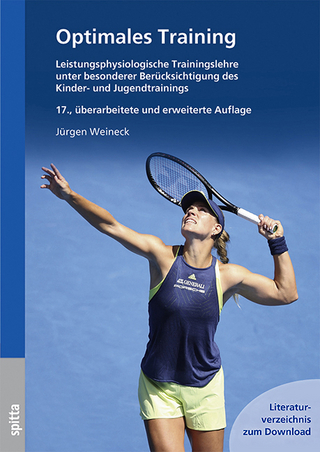
Exercise Physiology
McGraw-Hill Education / Australia (Verlag)
978-1-74307-713-9 (ISBN)
- Titel ist leider vergriffen;
keine Neuauflage - Artikel merken
With its clear and engaging style, this book is easy-to-read, but with a level of depth and breadth well suited to 1st and 2nd year students. The pedagogical framework of learning objectives, end of chapter material and boxed features help students focus and review the material they need to be learning, and see how it can be applied to help them study more effectively.
Balancing exercise physiology theory with practical skills, “Clinical Applications” shows students how the concepts that they are learning are used in the clinical setting, whilst “Research Focus” and “Ask the Expert” teaches how to read and think about the latest research. Combined with a digital package including quizzes and animations for biological and physiological processes, Powers offers the complete package for Exercise Physiology students.
Scott K. Powers is a Distinguished Professor and the UAA Endowed professor in the Department of Applied Physiology and Kinesiology at the University of Florida. Powers enjoys teaching and has earned three University of Florida teaching awards. Dr. Powers’ research has focused on exercise-mediated changes in cardiac and skeletal muscle antioxidant systems and the role that these changes play in providing protection against oxidant injury. Further, he is actively investigating the mechanisms responsible for respiratory muscle weakness in patients subjected to prolonged periods of mechanical ventilation. Dr. Powers’ laboratory work has been funded by grants totaling more than five million dollars from the National Institutes of Health, American Heart Association, American Lung Association, and the Florida Biomedical Research Program. This research has resulted in over 180 peer-reviewed research publications. Scott has also co-authored four college textbooks for use in exercise physiology and fitness courses. Powers is active in both the American Physiological Society and the American College of Sports Medicine. He also serves as an Associate Editor for the American Journal of Physiology-Reg. and is a member of the editorial board for the Journal of Applied Physiology, the International Journal of Sports Medicine, and the International Journal of Sport Nutrition and Exercise Metabolism. Scott Powers received his bachelor’s degree in physical education from Carson Newman College, his master’s degree in exercise physiology from the University of Georgia, and a doctorate (EdD) in exercise physiology from the University of Tennessee. Powers earned a second doctoral degree (PhD) in physiology from Louisiana State University. Edward Howley received his BS degree from Manhattan College and his MS and PhD degrees from The University of Wisconsin, Madison. He completed a one-year post-doctoral appointment at Penn State University and began his career at the University of Tennessee in 1970. He taught a variety of courses in physiology, exercise physiology and fitness testing and prescription over 36 years. He also served as an administrator of the Exercise Science program/department. He retired in 2007 and holds the rank of professor emeritus. He has received several awards for his teaching. Most of Dr. Howley’s volunteer efforts have been with the American College of Sports Medicine, where he served as president from 2002–2003. He is the Editor-in-Chief of ACSM’s Health & Fitness Journal, and is chair of the program planning committee for the annual ACSM Health & Fitness Summit meeting.
SECTION 1 PHYSIOLOGY OF EXERCISE
0 Introduction to Exercise Physiology
1 Measurement of Work, Power and Energy Expenditure
2 Control of the Internal Environment
3 Bioenergetics
4 Exercise Metabolism
5 Cell Signalling and the Hormonal Responses to Exercise
6 Exercise and the Immune System
7 The Nervous System: Structure and Control of Movement
8 Skeletal Muscle: Structure and Function
9 Circulatory Responses to Exercise
10 Respiration during Exercise
11 Acid-Base Balance during Exercise
12 Temperature Regulation
13 The Physiology of Training: Effect on V˙O2 Max, Performance, Homeostasis and Strength
SECTION 2 PHYSIOLOGY OF HEALTH AND FITNESS
14 Risk Factors and Inflammation: Links to Chronic Disease
15 Work Tests to Evaluate Cardiorespiratory Fitness
16 Exercise Prescriptions for Health and Fitness
17 Exercise for Special Populations
18 Body Composition and Nutrition for Health
SECTION 3 PHYSIOLOGY OF PERFORMANCE
19 Factors Affecting Performance
20 Laboratory Assessment of Human Performance
21 Training for Performance
22 Training for the Female Athlete, Children, Special Populations and the Master Athlete
23 Nutrition, Body Composition and Performance
24 Exercise and the Environment
25 Ergogenic Aids
| Erscheint lt. Verlag | 1.6.2014 |
|---|---|
| Sprache | englisch |
| Maße | 231 x 276 mm |
| Gewicht | 1365 g |
| Themenwelt | Sachbuch/Ratgeber ► Sport |
| Medizin / Pharmazie ► Medizinische Fachgebiete ► Sportmedizin | |
| ISBN-10 | 1-74307-713-0 / 1743077130 |
| ISBN-13 | 978-1-74307-713-9 / 9781743077139 |
| Zustand | Neuware |
| Haben Sie eine Frage zum Produkt? |
aus dem Bereich


